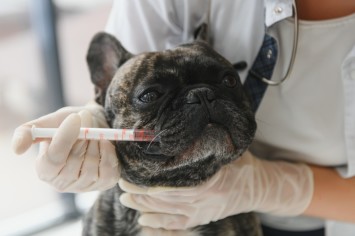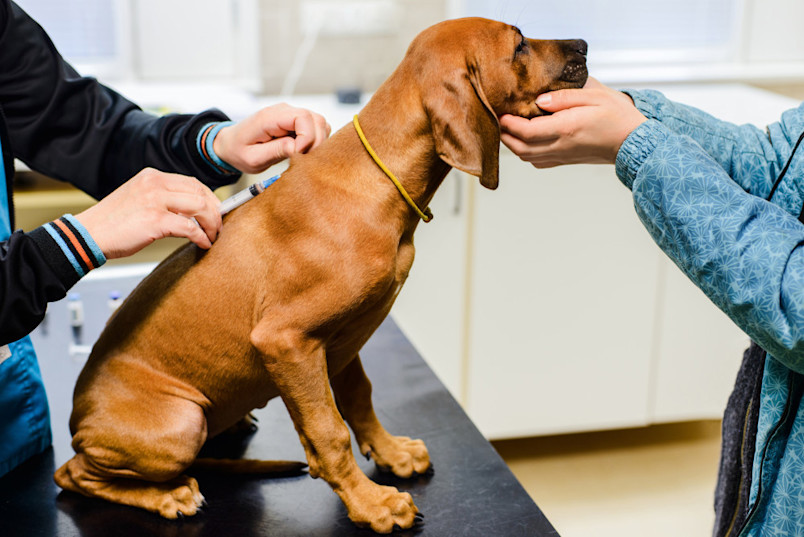
Think about that time your pup licked away your tears, when he kept you company during some lonely hours, or when your cat purring in your lap relieved all of your stress. Remember the first time your heart filled to bursting? Once you fall in love with your pet, you’ll do anything to keep them safe and healthy. Thankfully, the most important thing you can do for your pet is actually pretty simple: vaccinate them.
There are a lot of scary diseases out there that can permanently harm, or even kill, your furry friend. Science has come a long way in the past 100 years, and in areas with high vaccination rates, many diseases have been all but eradicated. Now, your vet can easily walk you through the recommended vaccinations that promise a longer, healthier life.
What Does Pet Insurance Cover?
The cost of puppy shots or kitten shots can be a little overwhelming. Pet insurance may seem like the obvious solution—but does pet insurance cover vaccines? Unfortunately, vaccinations are not covered by general pet insurance. Think of pet insurance more like catastrophic health insurance for humans, it covers accidents, illnesses, and other conditions, but most routine care is an out-of-pocket expense.
However, getting pet insurance early is still crucial. Many pet insurance companies exclude coverage for pre-existing conditions, which are any health issues your pet has before the policy start date. This means that if your pet develops a condition later on that is related to a pre-existing condition, your insurance won't cover the costs of treatment. By signing up for pet insurance early, when your pet is young and healthy, you can lock in coverage before any pre-existing conditions develop. Embrace is one of the few companies to offer pet insurance with pre-existing conditions, specifically for curable conditions.
While vaccinations aren’t included in pet insurance, you do have options. Pet insurance that covers vaccines aren’t generally available, but wellness plans are an add-on that helps you to budget for routine care, including vaccines. You pick the plan that works best for you, and you pay a monthly fee that goes into an account for when you need it. Choose the plan that's right for you – from smaller options for occasional vet visits to comprehensive coverage for growing pups and seniors. Knowing you have set aside money to take care of your loveable pet can give you peace of mind when it’s time for the next trip to the vet.
After your visit, the process is simple. You just submit the receipt to your insurance company, usually via an online portal, and they will reimburse for the visit, based on your plan. It’s basically just snapping a pic of the receipt, uploading it, and then waiting.

Common Vaccines for Pets
Now we know how important vaccines are and how to pay for them, but what vaccines does your precious pet need? The answer to this varies based on species, location, and lifestyle. Vaccines typically are divided into two categories—core and non-core. The core vaccines are essential for all pets, not only to keep your furry friend safe, but to protect the entire community.
Core vaccines for dogs include canine distemper, adenovirus, hepatitis, parvovirus, parainfluenza, and rabies. Typically, the rabies is a solo vaccine, while the others are combined into one, commonly referred to as DHPP or DAPP.
For cats, the core vaccines are feline panleukopenia, feline viral rhinotracheitis, feline caliciviruses, feline leukemia (for kittens only), and rabies. The first three of these are often given in a combined vaccine known as FVRCP, while the other two are usually given separately.
Non-core vaccines for dogs include:
Bordetella bronchiseptica (kennel cough), which is given based on lifestyle factors, including doggie daycare, trips to the dog park, and dog boarding.
Leptospira is a kidney disease spread by infected urine. This is usually recommended for rural pets in a geographic area where Leptospira is present, though recently cities have experienced outbreaks as well.
Borrelia burgdorferi (Lyme) is another vaccine based on geography. Where Lyme disease is prevalent, especially in the Northeast area of the U.S., this vaccine is especially important.
H3N3/H2N8 (canine influenza) is basically a doggy flu and is most likely to be a needed vaccine for those social pups who are in frequent contact with other dogs.
Crotalux atrox (rattlesnake) vaccine may be recommended for dogs who are likely to come in contact with western diamondback rattlesnakes, usually found in the Southwestern U.S. and into Mexico.
There are fewer non-core vaccines for cats, but your vet may recommend: Chlamydophila Felis, Bordetella brochispetica, and feline leukemia (for adult cats).
The list of vaccines can be overwhelming, but your vet will be there to guide you every step of the way. Your veterinarian is your partner in ensuring your pet receives the right protection at every stage of life. While their expertise is invaluable, staying informed about different vaccine options empowers you to make confident decisions alongside your vet. By working together with your vet and taking an active role in understanding your pet's needs, you can ensure they receive the optimal level of protection throughout their happy, healthy life.

Pet Insurance Providers Offering Vaccine Coverage
The pet insurance world is intimidating, to say the least. There are so many different providers, all with different rules. Some of these wellness plans offered will cap the number of vaccines, or the cost of the vaccine, rather than reimbursing you for the full amount. Make sure that you fully understand what is being covered when you get a plan. Some questions you may want to ask a provider include:
When will I have access to the full amount of my plan?
Do I have the freedom to choose what vet to use and which vaccinations to get?
What is excluded from the wellness plan?
“Does pet insurance cover vaccines?" is a question with a nuanced answer. Standard plans typically don't, but wellness plans added to your pet insurance can reimburse costs for essential vaccinations, annual exams, and preventive care.
Unlike restrictive pet insurance plans that limit your choices and coverage, Embrace's Wellness Rewards plan empowers you. Choose any vet, get reimbursed for the full cost of essential vaccines, and go beyond with coverage for spaying/neutering, microchipping, grooming, training, and more. It's more than budgeting for preventive care; it's about giving your pet the best life possible, with the freedom to choose what's best.
You know your pet better than anyone else, so only you and your vet can decide what is best for them. Make sure you choose a wellness plan that puts you in control, not an arbitrary insurance adjuster hundreds of miles away. At Embrace, pet wellness plans are a great budgeting tool created by and for pet parents like you, so that you can give your furry family members the best life possible.